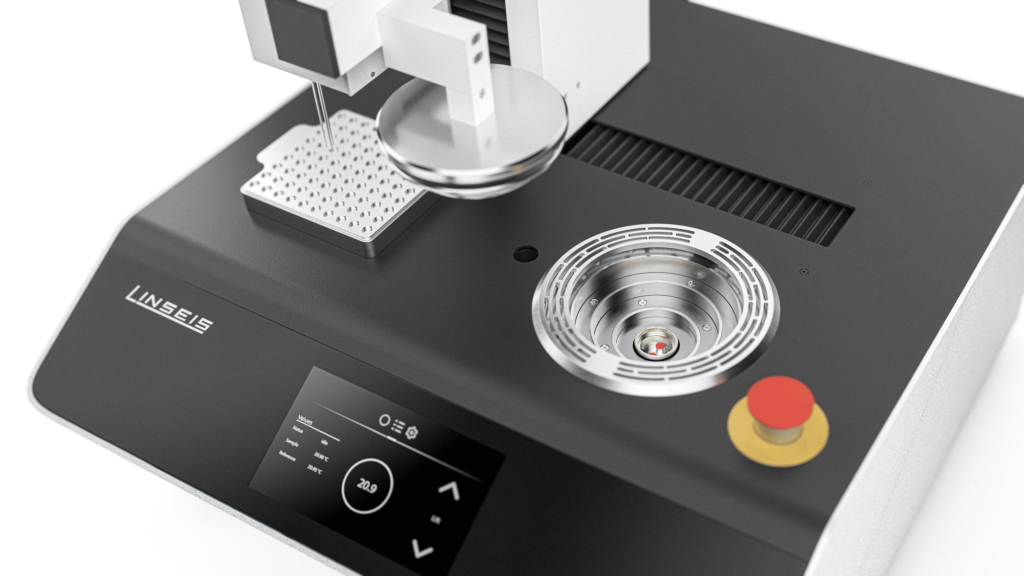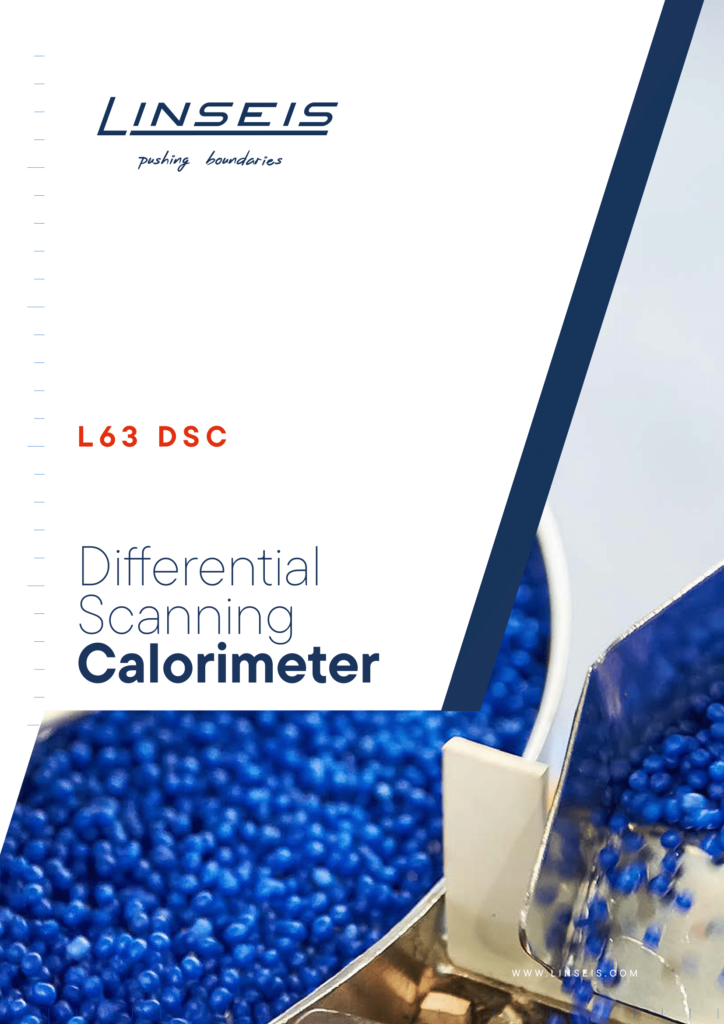The Differential Scanning Calorimetry (DSC) is the most important thermal analysis technique to measure endothermic and exothermic transitions as a function of temperature.
The instrument is used to characterize polymers, pharmaceuticals, foods/biologicals, organic and inorganic chemicals. Transitions measured include glass transition, melting, crystallization, curing, cure kinetics, oxidation induction time and heat capacity.
Unsurpassed performance
- Unsurpassed sensitivity – for detection of melts and weak transitions
- Benchmark resolution – precise separation of close lying events
- Reliable automation – up to 96 position autosampler
- Widest temperature range – from -170 °C to 750 °C in one measurement
The LINSEIS Differential Scanning Calorimeters (DSC) operate in agreement with national and international
standards such as: ASTM C 351, D 3417, D 3418, D 3895, D 4565, E 793, E 794, DIN 51004, 51007, 53765,
65467, DIN EN 728, ISO 10837, 11357, 11409
Unique features
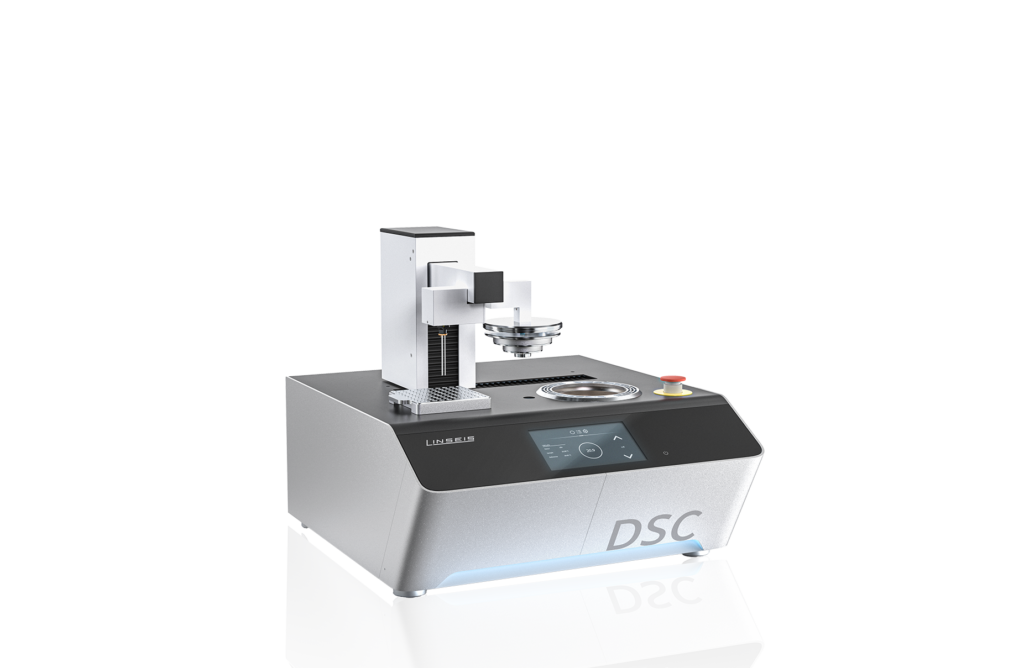
High-performance sensor
Wide temperature range
Robust design
Versatile
application options
Questions? We're just a call away!
+01 (609) 223 2070
+49 (0) 9287/880 0
Our service is available Monday to
Thursday from 8 am to 4 pm
and Friday from 8 am to 12 pm.
We are here for you!
Specifications
MODELL | DSC L63 Basic | DSC L63 Advanced | DSC L63 Ultimate |
|---|---|---|---|
| Heating rate: | 0.01 K/min to 100 K/min | 0.01 K/min to 150 K/min | 0.01 K/min to 150 K/min |
| Cooling rate: | Intracooler: 5 min (100 to 0 °C) LN2: 10 min (100 to -100 °C) | Intracooler: 5 min (100 to 0 °C) LN2: 10 min (100 to -100 °C) | Intracooler: 5 min (100 to 0 °C) LN2: 10 min (100 to -100 °C) |
| Temperature range: | -170°C - 600°C | -170°C - 750°C | -170°C - 750°C |
| User replaceable heatsink/cooling options: | Yes | Yes | Yes |
| User replaceable furnace with sensors: | Yes Furnace material: silver | Yes Furnace material: silver | Yes Furnace material: silver |
| Data capture: | 100 Hz | 100 Hz | 100 Hz |
| Temperature Accuracy: | ±0,1 K | ±0,1 K | ±0,1 K |
| Enthalpy Precision: | < 1 % (Indium, Zinc) | < 1 % (Indium, Zinc) | < 1 % (Indium, Zinc) |
| Measuring range: | ± 750 mW | ± 750 mW | ± 750 mW |
| MFC (with 3 gases): | Optional | Integrated | Integrated |
| Unlimited warranty: | Optional* | Optional* | Optional* |
| *In connection with a maintenance agreement | |||
Sample dimensions | Temperature range |
|---|---|
| Intracooler | Basic: -70 °C bis 600 °C Advanced: -70 °C bis 750 °C Ultimate: -70 °C bis 750 °C* |
| LN2 | Basic: -170 °C bis 600 °C Advanced/Ultimate: -170 °C bis 750 °C |
| Combined Cooling LN2 & Intracooler | Basic: -150 °C bis 600 °C Advanced/Ultimate: -150 °C bis 750 °C |
| * At coldfinger | |
Hardware Options
Optical DSC
The L63 DSC can be equipped with
a CCD camera to observe the sample
during the measurement. The visualization of the sample gives a much
deeper insight to phase transitions
and decomposition processes.
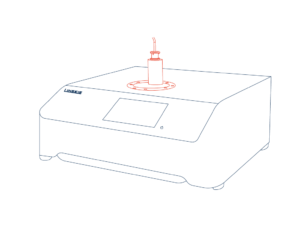
Sample Robot DSC
The sample robot for up to 96 samples increases the productivity significantly. The instrument can run automatically overnight or at the weekend. Together with the intuitive and intelligent software it reduces labour costs and saves time.
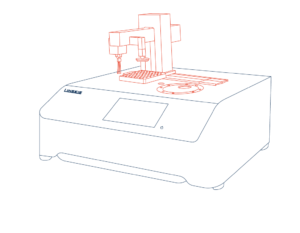
Available accessories
DSC-sample-press
For optimum sample preparation of aluminum
crucibles a ergonomic sample press is available.
Crucibles
Various crucibles made of aluminum, alumina, copper, gold, platinum and sapphire are available for
measurements with the L63 DSC. Other crucibles are
available on request.
User exchangeable Furnaces
The new user exchangable furnace can be replaced
within a few screws. This innovative
concept reduces the maintenance costs drastically
Software
Making values visible and comparable
The software greatly enhances your workflow as the intuitive data handling only requires minimum parameter input. AutoEval offers a valuable
guidance for the user when evaluating standard processes such as
melting and crystallization points. The optional thermal library product
identification tool, provides a database permitting an automatic identification tool for your tested polymer. Instrument control and/or surveillance through mobile devices gives you control wherever you are.

- Software packages are compatible with latest Windows operating system
- All specific measuring parameters (User, Lab, Sample, Company, etc.)
- Optional password and user levels
- Undo and redo function for all steps
- Infinite heating, cooling or dwell time segments
- Multiple language versions such as English, German, French, Spanish, Chinese, Japanese, Russian, etc. (user selectable)
- The evaluation software offers a wide range of functions for the comprehensive analysis of all data types
- Complete evaluation history (all steps can be undone)
- Data acquisition and evaluation can be performed simultaneously
- Data can be corrected using zero correction
- Data evaluation includes: software signal correction and smoothing, first and second derivative, curve arithmetic, data peak evaluation, glass point evaluation, zoom, multiple curve overlay, annotation, copy to clipboard function, multiple export features for graphic and data export, automatic gas control
Application
Application example: Cooling rate with an Intracooler
The new DSC system offers an innovative design with a wide temperature range from -70 °C to 750 °C, without the need for reconfiguring the cooling options. This allows for a more efficient workflow by eliminating time-consuming adjustments. The instrument enables seamless
transitions between low and high temperatures, making it ideal for demanding applications
such as material research, polymer analysis, and quality control. With its high flexibility and
user-friendly operation, this DSC sets a new standard for advanced thermal analysis.
In the graph shown above, you can see how the intracooler ensures efficient and rapid cooling.
Cooling rate | Up to the lower temperature |
|---|---|
| 100 K/min | 560 °C |
| 50 K/min | 240 °C |
| 20 K/min | 40 °C |
| 10 K/min | -30 °C |
| 5 K/min | -48 °C |
| 1 K/min | -60 °C |
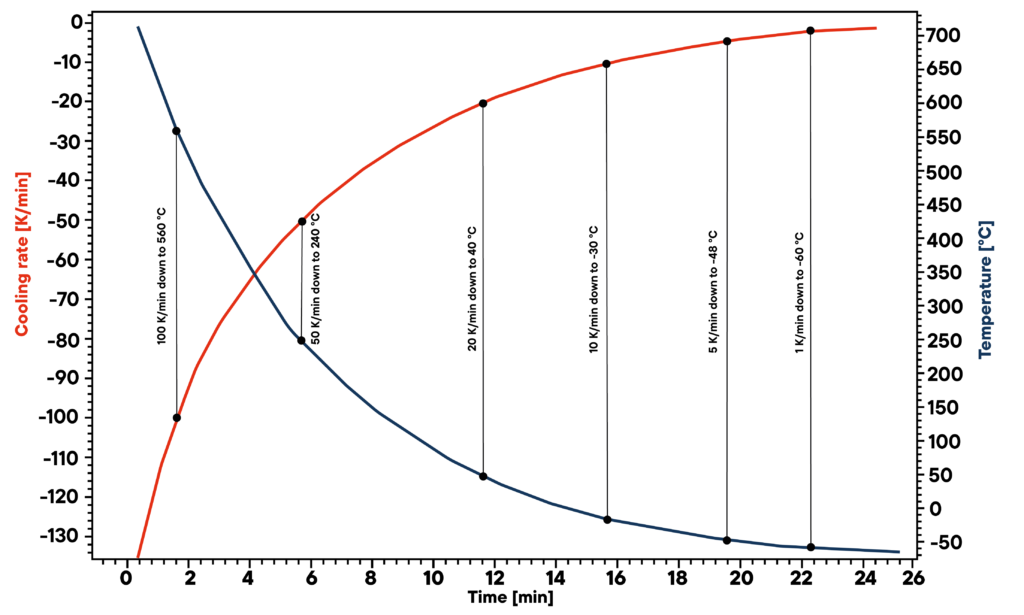
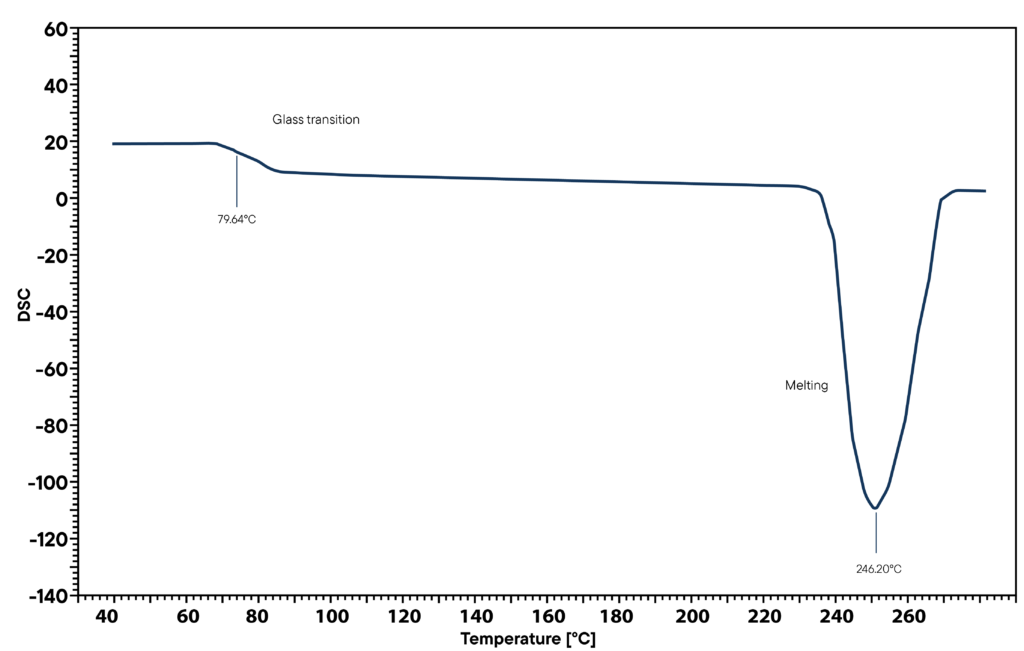
Application example: PET Granulate 1. Heating
The analysis of polymers is one of the main applications of DSC. Effects such as glass transitions, melting, and crystallization points are of interest and often challenging to detect. The new LINSEIS L63 DSC offers high resolution and sensitivity, making it an ideal instrument for this type of analysis. With its innovative design, it is now possible
to analyze important properties of the sample even during the initial heating of the PET granulate using the L63 DSC at a linear heating rate of 20 K/min. The curve shows a significant glass transition around 80 °C, followed by a melting peak at 246 °C.
Application example: PET Granulate 2. Heating
Depending on the cooling rate, the degree of crystallinity of the polymer changes significantly. During a subsequent heating run, cold crystallization can be observed with a linear heating rate of 20 K/min. The curve reveals a distinct glass transition at around 80 °C, followed by cold crystallization of the amorphous regions starting at approximately 148 °C and a melting peak at starting 230 °C. This allows the complete characterization of the sample with just two heating cycles.
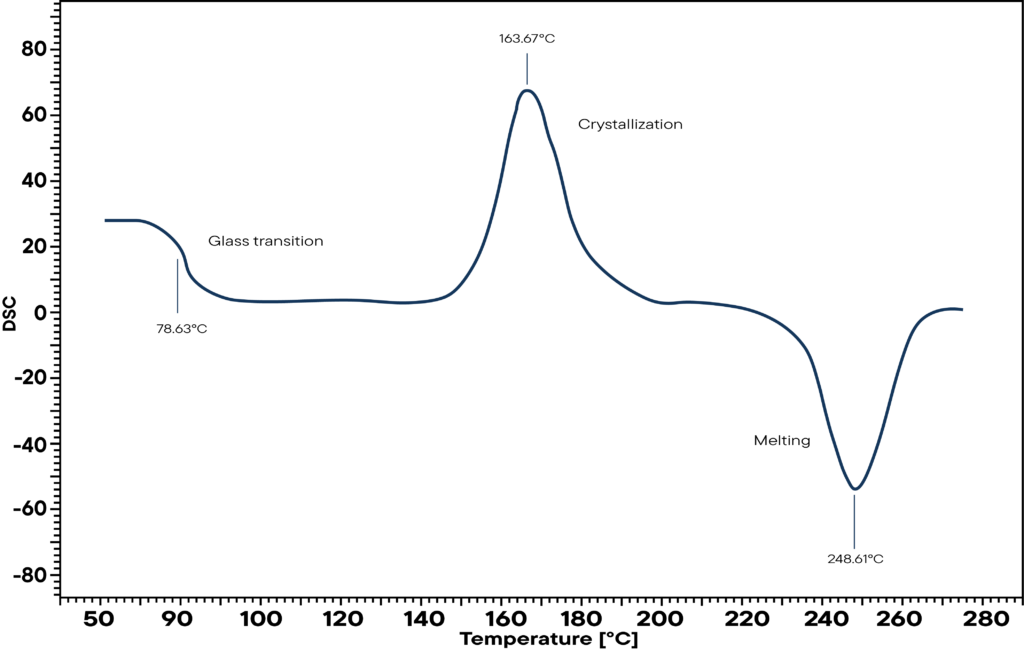
Well informed
